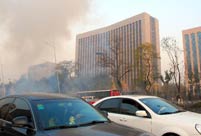UNITED NATIONS, Nov. 12 -- A senior official with the United Nations Development Program (UNDP) has called on the international community to focus their attention on the serious insecurity in Latin America -- a region that has experienced more than 1 million homicides annually over the past decade.
The Latin American region is facing a couple of crippling regional challenges, the UN assistant secretary-general and UNDP's director for Latin America and the Caribbean, Heraldo Munoz, said in a recent interview with Xinhua.
Inequality and citizen insecurity are the two main challenges, he said.
On inequality, he said, "This is one of the most unequal regions in the world measured by income."
"Not only is this one of the most unequal regions of the world, it is also one of the most dangerous and violent measured by homicides per 100,000 population," he said.
"If you look at any other region, Latin America unfortunately has the record in terms of homicides," he said.
The UNDP said in a report on Tuesday that Latin America experienced both economic growth and increased crime rates over the past decade, with more than 100,000 murders per year during that time, calling for inclusive economic growth and enhanced security and justice institutions as the most efficient ways to reduce insecurity.
Munoz said "last year it was Honduras that reached 85 homicides per 100,000 population," adding that "the global average is about 6 homicides per 100,000" and "the average for Latin America is around 22."
"So we're looking at a situation in Latin America from the point of view of homicides that is equivalent to epidemic, according to the World Health Organization (WHO)," he said.
Despite the startling murder statistics, Latin America is experiencing financial prosperity.
However, "the economic growth we have had has been of low quality and it has been of central consumption," he said. "That has created, even though people have emerged from poverty, it has created rights and expectations."
"In other words, there are some individuals that commit crimes because this is a consumption society that we have created in the region and people are falling behind," Munoz said. "Some people want more and feel like they are not getting their fair share and that might be one of the explanations."
In face of the situation, the Chilean diplomat suggested governments in the region do not resort to the "the iron fist" policies.
"Very broadly the first thing we say is, do not try the iron fist," Munoz said. "Do not try these policies that look for short gains like lowering the age of penal responsibility or building more jails or simply hardening the bills covering crime because the evidence shows that does not work."
"What we need is integrated policies and multidimensional policies that look at prevention in a major way," he said.
As a result, the policies should look at working with local communities because that is key, Munoz said.
Right now, the UNDP is working in 12 different countries within the region and there are three nations that have witnessed results.
"In El Salvador, we are working with local governments in a couple of municipalities," he said. In this regard, "we have been working very closely on programs including in one municipality where carrying weapons is forbidden."
In the Dominican Republic, the United Nations has created a manual for the national police to follow, he said.
"We have seen a very significant drop in crime in Costa Rica and in their design of their national citizen and security policy, " he said.
 Luxury-cars parade held in Dubai
Luxury-cars parade held in Dubai Special forces take tough training sessions
Special forces take tough training sessions Fire guts 22-storey Nigeria commercial building in Lagos
Fire guts 22-storey Nigeria commercial building in Lagos A girl takes care of paralyzed father for 10 years
A girl takes care of paralyzed father for 10 years A record of Beijing air quality change
A record of Beijing air quality change In pictures: explosions occur in Taiyuan
In pictures: explosions occur in Taiyuan Live a harmonious life in Pu'er, SW China
Live a harmonious life in Pu'er, SW China Weekly Sports Photos
Weekly Sports Photos Gingko leaves turn brilliant golden yellow in Beijing
Gingko leaves turn brilliant golden yellow in Beijing Maritime counter-terrorism drill
Maritime counter-terrorism drill Loyal dog waits for master for six months
Loyal dog waits for master for six months The catwalk to the world of fashion
The catwalk to the world of fashion  China in autumn: Kingdom of red and golden
China in autumn: Kingdom of red and golden National Geographic Traveler Photo Contest
National Geographic Traveler Photo Contest Living in an urban village: 'Iron-digger' Xiong Sansan
Living in an urban village: 'Iron-digger' Xiong SansanDay|Week|Month